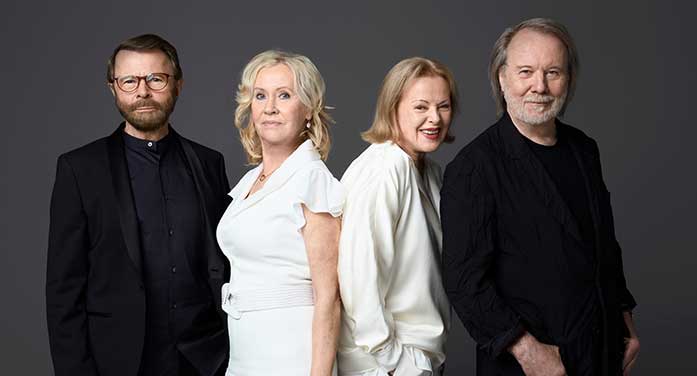 On Nov. 5, the Swedish pop group ABBA released its first album of new songs in 40 years, Voyage. It will likely rocket up the charts and sell in the millions.
On Nov. 5, the Swedish pop group ABBA released its first album of new songs in 40 years, Voyage. It will likely rocket up the charts and sell in the millions.
Voyage may even end up breaking the record held by Michael Jackson’s Thriller of around 70 million copies sold. Considering the fact that ABBA “currently leads the chart race after securing a record 111,000 ‘pre-sales’ for Voyage” in the United Kingdom alone, according to The Independent’s Adam Sherwin on Oct. 15, anything is possible.
You know what my immediate reaction to ABBA’s return to the music industry is?
Big deal.
I can’t stand ABBA. Few bands and solo acts are as deplorable, from my perspective.
Lord knows I’ve heard more than my fair share of their syrupy sounds. From my father, who owns most of their albums, to my wife, who enthusiastically watched the musical Mamma Mia! (with me in tow) many moons ago, it’s been hard to escape this band’s sickeningly sweet embrace. Tracks like Waterloo, Mamma Mia, I Do, I Do, I Do, I Do, I Do, and others have induced more than several massive waves of nausea.
My son has been kept far, far away from ABBA. If I can save one person in this lifetime, let it be him.
Many people would disagree with my assessment. They’ve been waiting on pins and needles for the Vikings of pop music to reappear and toast them with Akvavit in a manner that would make Eric the Victorious blush like a Swedish berry.
 The number of rumours and reports that ABBA was making a comeback has always been pretty competitive. Greatest hits packages were released. Songs were included in movie soundtracks. Mamma Mia! the play was a success on Broadway and the West End. A cameo appearance at the 2004 Eurovision Song Contest, which they had won 30 years earlier, created additional buzz.
The number of rumours and reports that ABBA was making a comeback has always been pretty competitive. Greatest hits packages were released. Songs were included in movie soundtracks. Mamma Mia! the play was a success on Broadway and the West End. A cameo appearance at the 2004 Eurovision Song Contest, which they had won 30 years earlier, created additional buzz.
Things intensified after the movie Mamma Mia! did well at the box office in 2008, followed by its sequel, Mamma Mia! Here We Go Again, in 2018.
This led to confirmed reports that the four original band members – Agnetha Fältskog, Björn Ulvaeus, Benny Andersson and Anni-Frid Lyngstad – were going to release two new singles for a planned NBC/BBC One special, ABBA: Thank You for the Music, An All-Star Tribute.
Things were delayed several times between 2018 to 2021 and the special was cancelled last month. The two songs, I Still Have Faith in You and Don’t Shut Me Down, were released instead as a dual single in September and will be complemented with a digital concert residency, ABBA Voyage, in 2022.
BBC music reporter Mark Savage described I Still Have Faith in You on Sept. 2, writing, “slowly, majestically, it builds to an astronomical climax, full of power chords and dazzling harmonies.” New York Times music reporter Jon Pareles’s Sept. 3 review of Don’t Shut Me Down depicted it as a “strutting march with gleaming orchestration and scrubbing disco guitars, stolid and earnestly tuneful.”
That’s all well and good, but these two assessments are so bloody predictable. They sound exactly like what music critics wrote about ABBA when songs from albums like Waterloo (1974) and Super Trouper (1980) were released.
When I was a columnist for the Moncton Times & Transcript, I wrote this on Aug. 18, 2000: “There isn’t a middle ground with an ABBA song: all of them sound the same, the musical chords never change, and the lyrics aren’t all that different. Every song is either so darn happy and bouncy, or so bloody morbid and slow.”
Care to prove me wrong?
I’ll wait.
You may feel I’m being too hard on ABBA, but I’m not alone.
The critics also didn’t care much for them. ABBA never won a Grammy in its heyday and never even received a nomination. (The group was nominated to the Grammy Hall of Fame in 2015.) ABBA hasn’t won an American Music Award or Brit Award, either. While they found their way onto lists of Top 20 and Top 25 pop bands, this recognition was based more on fan approval than critical acclaim.
Hold on, some may say. ABBA is one of the best-selling music artists of all time. That must count for something.
Should record sales be the only marker of success?
I don’t think so. It’s also important to consider singing/songwriting ability, talent, incorporating different musical genres into albums and so forth.
Nothing has changed with the release of ABBA’s two new songs and (one presumes) Voyage. This, in effect, means there’s really been no musical growth, development or curiosity in four decades. On many of these fronts (and others), ABBA has clearly been far less successful and creative than its contemporaries.
Fortunately, there’s a silver lining: ABBA’s return will mercifully be short-lived. Ulvaeus and Andersson confirmed Voyage will be the group’s final album. As the latter told Euronews on Oct. 28, “This is it. It’s got to be, you know.”
That’s music to my ears. ABBA-cadabra, make them disappear as soon as possible!
Michael Taube, a Troy Media syndicated columnist and Washington Times contributor, was a speechwriter for former prime minister Stephen Harper. He holds a master’s degree in comparative politics from the London School of Economics. For interview requests, click here.
The views, opinions and positions expressed by columnists and contributors are the authors’ alone. They do not inherently or expressly reflect the views, opinions and/or positions of our publication.
© Troy Media
Troy Media is an editorial content provider to media outlets and its own hosted community news outlets across Canada.



A review by someone who doesn’t get it. ABBA was/is loved by their peers in the industry from Cobain to Lennon, Costello to Bono, Madonna to the Bee Gees. Their compositions were often brilliant and had depth. Go back and listen to ‘The Album’. All of it, from “Eagle to “I’m A Marionette”. I HATE the ‘Mamma Mia’ versions of their music, but there’s so much more than the fluffy songs you mentioned.